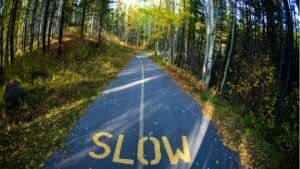
In a world that seems to spin ever faster, the notion of slowing down can feel counterintuitive. We know the benefits of embracing a slower pace in our daily lives can enhance our mental health, improve our physical well-being, foster deeper relationships, and ultimately, enrich our overall quality of life.
Recently, I have been taking some online calligraphy courses and enlisted the help of a virtual tutor. One of the biggest lessons I have learned is that if I slow down and use breath work through my calligraphy strokes, they will look better, and I will make faster progress in my learning!
I’ve found that slowing down during this process helps me to stay present in the activity and helps to foster a sense of tranquility that helps later on in the day with mental clarity and emotional balance. Who would have known!
I have also been working with a swim coach as I felt that I was working against the water and not having a relaxing experience during the swim. I was hearing the same message from my coach, “Slow down. Let the lead arm do the gliding.” I’ve been consistent with my practicing and feel the difference. In slowing down my stroke and working through the process, I am having fun and I’m feeling that slow glide through the water that I was seeking.
In my sewing, I’ve found that if I slow down to press each seam and apply more pins to the garment then my work will be more accurate, and I’ll have less challenges down the road piecing together my project!
If I was hearing this message in these instances, where else did I need to slow down my activity to achieve the true benefit?
Some Things to Consider
Slowing Down and Health
Physical health also reaps the rewards of a slower pace. When we hurry through our days, we often neglect important aspects of our well-being, such as proper nutrition, adequate sleep, and regular exercise. Slowing down gives us the space to prioritize these essentials.
For instance, taking the time to prepare a wholesome meal rather than grabbing fast food on the go can lead to better nutrition and digestion. Similarly, allowing ourselves to unwind before bed can improve sleep quality, while incorporating leisurely walks or stretching into our routine can enhance our physical fitness.
Impact of Slowing Down on Relationships
Slowing down can significantly enhance ourrelationships. In the hustle and bustle of modern life, meaningful interactions with loved ones can become superficial or sporadic. By deliberately setting aside time to connect with family and friends, we nurture deeper, more fulfilling relationships.
Engaging in uninterrupted conversations, sharing activities, or simply being present with others can strengthen bonds and foster a greater sense of connection and support.
Slowing Down to Stimulate Creativity
Creativity and productivity can also flourish when we slow down. Contrary to the belief that constant busyness leads to greater output, research shows that taking breaks and allowing time for reflection can boost creativity and problem-solving abilities.
When we step back from our relentless schedules, we provide our minds with the opportunity to wander, which often leads to innovative ideas and solutions that might otherwise remain buried under the weight of a hectic pace.
Enjoy Life by Slowing Down
Slowing down cultivates a greater appreciation for life’s simple pleasures. When we rush, we miss out on the beauty of our surroundings and the joy of everyday moments. By moving more slowly, we can savor the taste of our food, relish the warmth of the sun, and find contentment in the present.
This mindful approach to living not only enhances our immediate experiences but also contributes to a lasting sense of fulfillment and happiness.
5 Steps to Begin the Art of Slowing Down
Prioritize and Simplify
Start by identifying the most important tasks and commitments in your life. Focus on what truly matters and let go of unnecessary obligations that contribute to a hectic schedule.
Practice Mindfulness
Incorporate mindfulness practices into your daily routine. Spend a few minutes each day meditating, breathing deeply, or simply being aware of your surroundings. This helps anchor you in the present moment.
Set Boundaries
Establish boundaries to protect your time and energy. This might mean saying no to additional commitments, setting aside technology-free time, or creating a designated space for relaxation.
Slow Down Your Routine
Make small changes to slow down your daily activities. For example, eat your meals more slowly, take leisurely walks, or engage in a hobby that requires patience and focus, like gardening or painting.
Reflect and Adjust
Regularly take time to reflect on your pace of life. Assess what is working and what isn’t, and be willing to make adjustments. This continuous reflection helps ensure that slowing down becomes a sustainable part of your lifestyle.
Slowing down is not about doing less but about living more fully. By embracing a slower pace and implementing these steps, we can improve our mental and physical health, deepen our relationships, enhance our creativity, and cultivate a richer appreciation for life.
Let’s Have a Conversation:
Where do you find that slowing down improves your overall sense of wellbeing? How do you make yourself slow down? What benefits have you noticed in your daily life when you do things more slowly?





